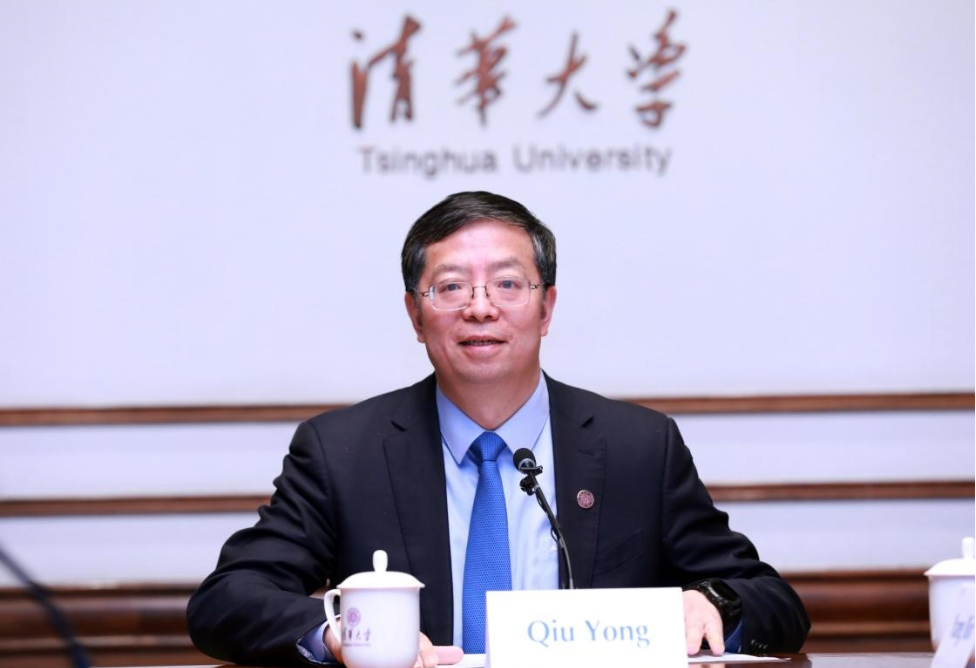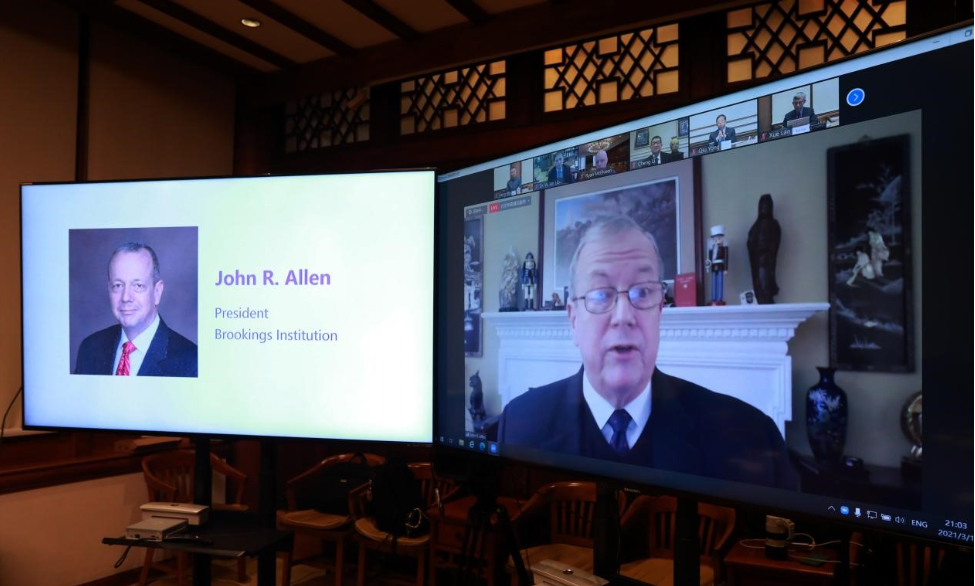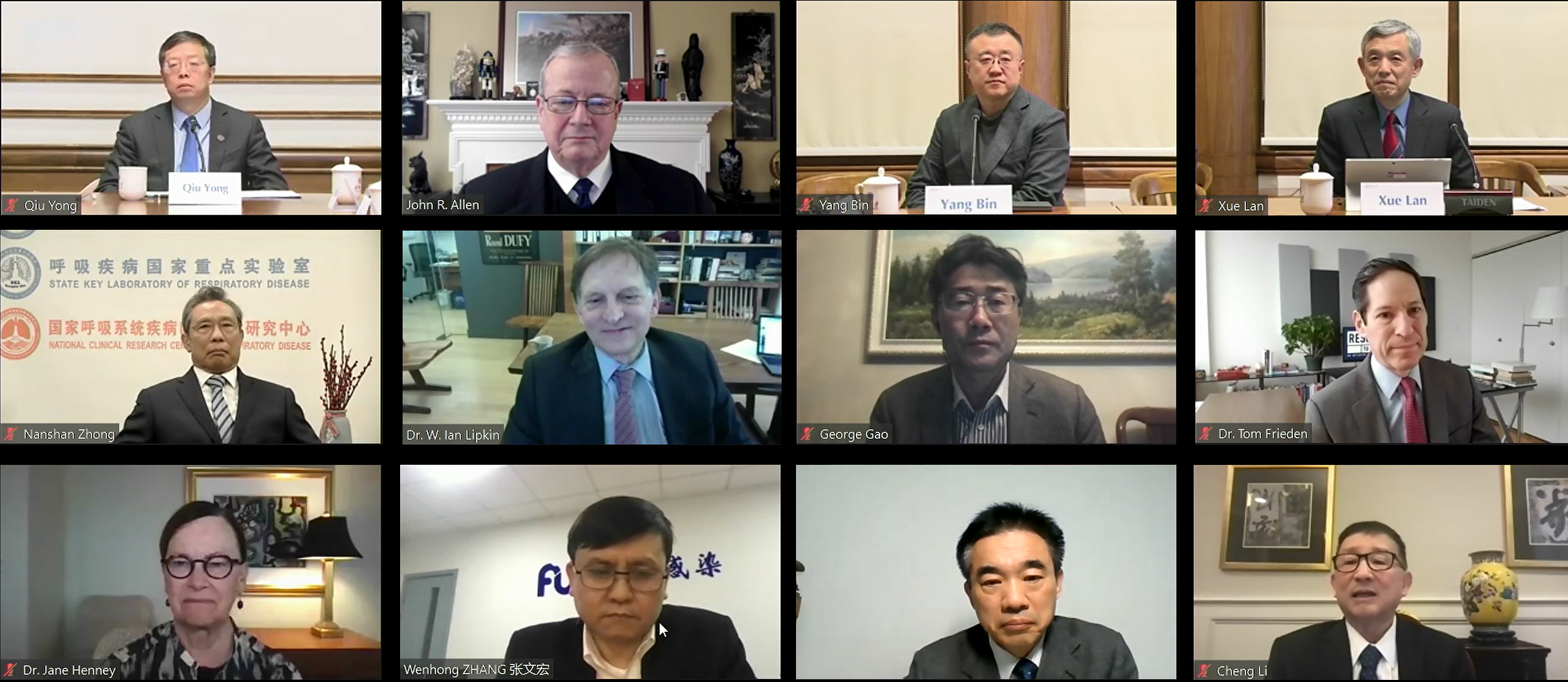Leading public health experts from China and the U.S. urged the world’s two largest economies to join forces in expanding global access to COVID-19 vaccines for a speedy global economy recovery at a webinar co-hosted by Tsinghua University and the Brookings Institution on Monday.

Tsinghua University President Qiu Yong and the Brookings Institution President John R. Allen delivered their opening remarks at the webinar entitled “Fast Track to Recovery: US-China Collaboration on COVID-19 Prevention and Treatment.”
President Qiu said Tsinghua was looking forward to working together with the Brookings Institution and the global community to facilitate a faster recovery from the pandemic through academic exchanges and research collaboration.
“As we enter the period of vaccine distribution, it is vital that we work together to develop and form concrete policy recommendations for the next stage,” he said, adding that the rapid development of several effective vaccines against COVID-19 offers the promise of a durable solution to the pandemic.

Brookings President Allen said that the change in administration in the U.S. offers an opportunity for leaders on both sides to examine what can be done differently and set a new course for how the U.S. and China can address the shared threat of COVID-19.
Stating that the U.S. and China have a long history of working together to combat diseases from SARS to Ebola, he said that when the two countries join forces to fight COVID-19, the world would have a better chance to emerge from the pandemic stronger.
He expressed hope that experts attending the webinar would present actionable steps to leaders in both countries to help them take steps to save lives within their borders, but importantly beyond their borders.

The opening remarks were followed by a keynote conversation session addressed by Dr. Zhong Nanshan, Head of the Expert Group of China’s National Health Commission, Dr. W. Ian Lipkin, Director of the Center for Infection and Immunity at the Mailman School of Public Health of Columbia University, and Dr. George F. Gao, Director-General of the Chinese Center for Disease Control and Prevention. Xue Lan, Dean of Tsinghua’s Schwarzman College, moderated the session.
Dr. Zhong said the discovery of multiple SARS-CoV-2 variants globally and the mutation of COVID-19 pose a big challenge in the latest fight against the pandemic as they diminish the effectiveness of vaccination and antibody treatments.
He stressed the need to have close collaboration between the two countries on COVID-19 research, as producing improved vaccines and cocktail antibodies would play an essential role in addressing the next wave of the pandemic in the near future.
He said China-U.S. collaboration on COVID-19 prevention and treatment should be based on science and evidence rather than politicization.
Dr. Lipkin, Director at Columbia’s Center for Infection and Immunity, said that there was a need for a global food and drugs administration of testing and rational distribution of diagnostics, drugs, and vaccines to mitigate diseases as they pose not only a threat to human health but also climate and food security. “We need to work together in a global fashion.”
Dr. Gao, Director-General of the Chinese Center for Disease Control and Prevention, said China and the U.S. should work together to promote COVAX, a global initiative led by Gavi, the Coalition for Epidemic Preparedness Innovations (CEPI) and WHO aimed at equitable access to COVID-19 vaccines, as well as the United Nation’s 17 SDGs and inequities.
According to his estimate, it was unlikely for the world to return to completely normal as before, but it could gain relative normality by next summer if the current trends persisted.
Dr. Tom Frieden, former Director of the U.S Center for Disease Control and Prevention, Dr. Jane Henney, former Commissioner of the U.S. Food and Drug Administration, Dr. Wu Zunyou, Chief Epidemiologist at the Chinese Center for Disease Control and Prevention, and Dr. Zhang Wenhong, Head of the Shanghai Anti-Covid-19 clinical expert team, attended the experts panel of the webinar.
Dr. Frieden said China and U.S. could collaborate to develop effective real-time surveillance and response systems in the countries around the world to detect every outbreak within seven days of its emergence, to make the world much safer.
“Vaccine nationalism will backfire. Only global collaboration against the virus can lead to global recovery,” he said. “This is the world’s moment to work together. And the U.S. and China have a unique role to play.”
Dr. Henny, former Commissioner of the U.S. Food and Drug Administration, briefed about the U.S.’s vaccination efforts in the country and highlighted the importance to keep learning from research to better deal with COVID-19.
Dr. Wu, Chief Epidemiologist at the Chinese Center for Disease Control and Prevention, said the future direction of the pandemic move would depend on health measures taken by the countries, the coverage of vaccination, and how long the vaccine provided protection against the virus.
Dr. Zhang, Head of the Shanghai Anti-Covid-19 clinical expert team, said China and the U.S., as the major vaccine producers of the world, had a major responsibility to implement their strategies for mass immunization, not only by taking into account their own countries, but also the least developed countries in the world.
He said China’s current strategy was to promote the establishment of a global immune barrier in a coordinated international framework, similar to COVAX or the WHO.
The panel was moderated by Cheng Li, Director of the John L. Thornton China Center, Brookings Institution.
The webinar, which was live-streamed on various social media platforms, was viewed by millions of viewers worldwide.
Reporters: Guo Lili, Sangeet Sangroula
Editors: Guo Lili,John Olbrich

